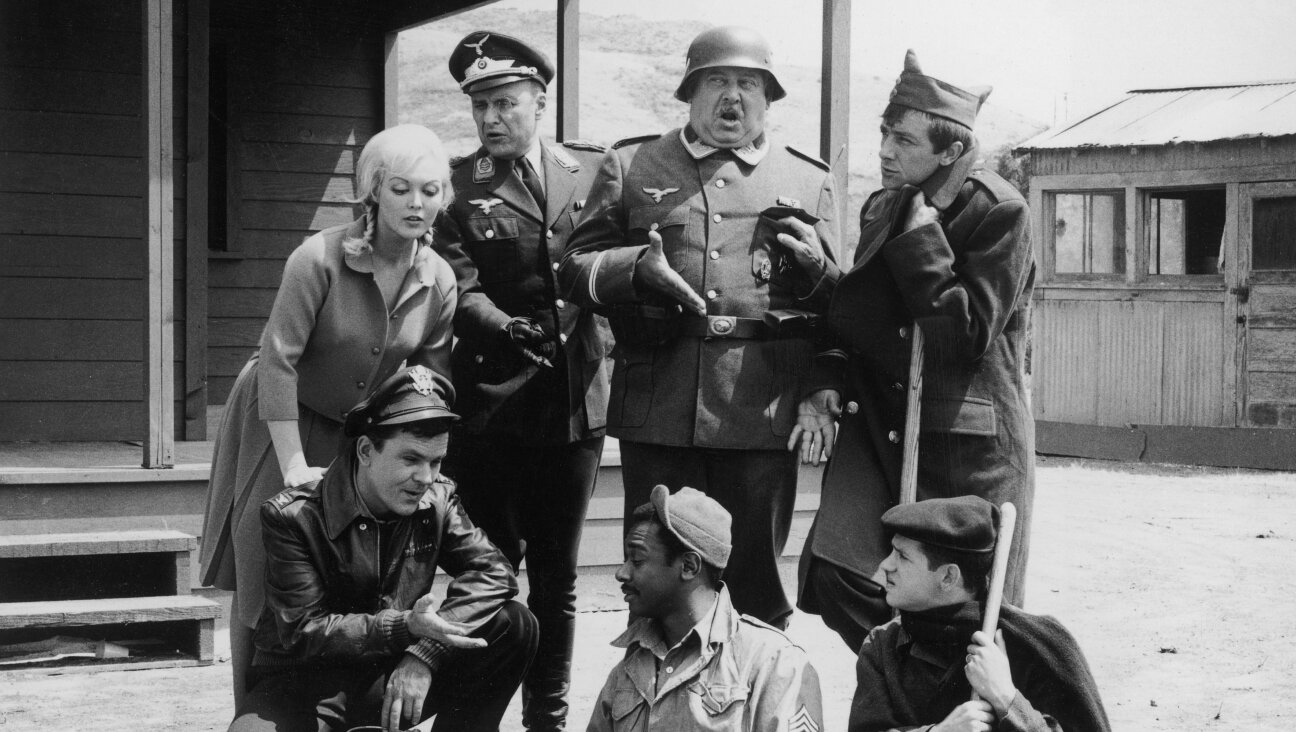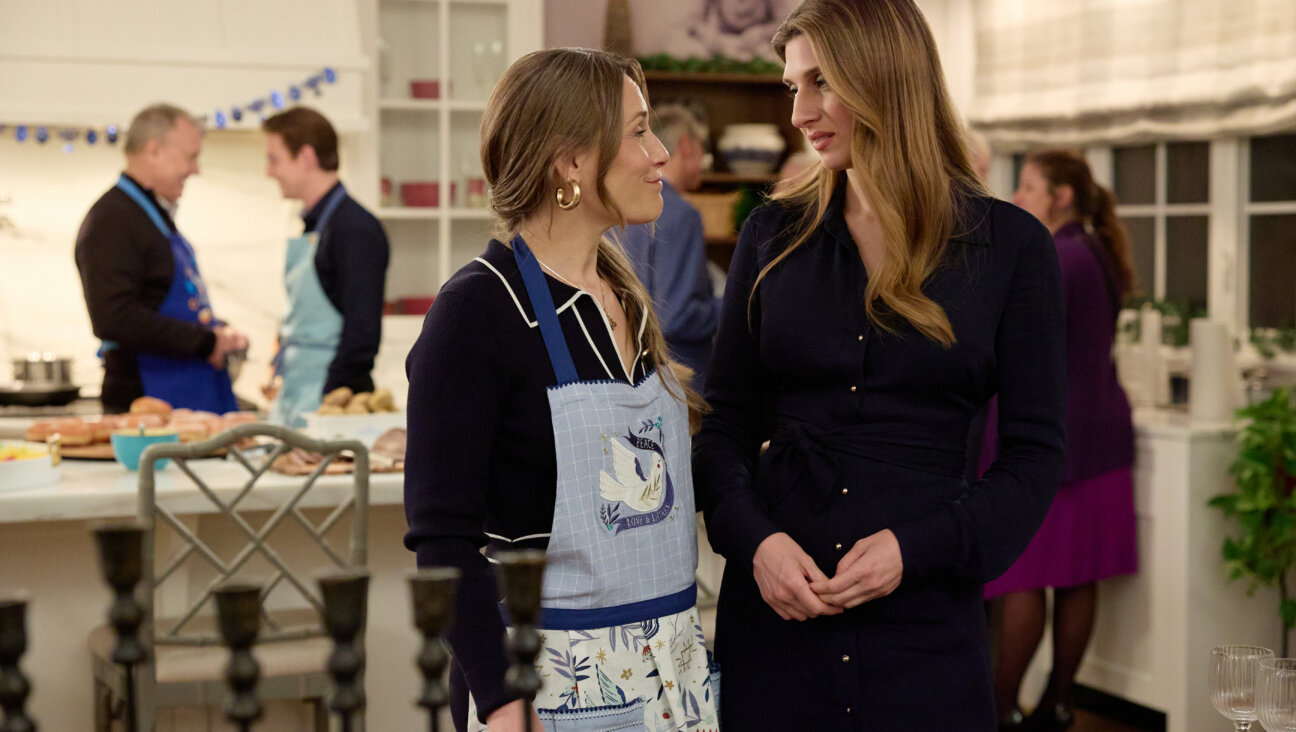Is ‘Orange Is the New Black’ Anti-Semitic?

If, unlike me, you didn’t spend your entire weekend binge-watching the new season of “Orange is The New Black,” you may not be aware of the major Jewish narrative arc that has developed at Litchfield Penitentiary.
My first reaction was jubilation.
And then I started watching.
And disappointment hit.
Because despite the laughs and the “Shabbat Shalom b**ches!” there is a bitter undertone of prejudice to the whole storyline.
(If you haven’t gotten up to episodes 6 through 9 of “Orange is the New Black,” watch out — spoilers ahead!)
Recap: As always, trouble is brewing in the kitchens of Litchfield. When a new inmate asks for a kosher meal, the staff is caught off guard. By law, they must provide kosher food for any inmate who religious belief.
READ: The Great Kosher Debate Hits ‘Orange is The New Black’
It all starts out pretty funny. Lolly, who we know from Piper’s stint in Chicago during Season 2, walks up to the food counter and demands a kosher meal. Ruiz, who’s serving, looks at her like she’s grown an extra head. “Some tweaker wants kosher,” she yells out at the rest of the kitchen staff.
Turns out, Lolly is not Jewish at all. She’s Lutheran, but it doesn’t matter because “They can’t ask you on account of the Holocaust.”
Soon enough, other inmates catch on that you can get a special meal (with eggs!), and follow Lolly’s lead.
The problem here is not that people are faking Jewish belief to get better meals. (I would not be above faking faith to get chicken nuggets instead of “creamy chicken gruel.”) It’s the assumption that Jews get special treatment: “How come Jews only get to eat this deliciousness?”
No one asking for the food is actually Jewish — they just see the food is better (the broccoli actually has some crunch left in it!).
This is actually a real prison phenomenon. As the Forward reported in 2012, roughly 2% of the prison population receives a so-called Certified Religious Diet, which costs $2.33 per meal as opposed to the regular $0.99. As in episode 9, amusingly called “Where My Dreidels At?,” where a rabbi is brought in to assess the inmates’ commitment to the Jewish faith, prisoners who want access to this special diet must meet with a chaplain.
In the show, however, the old stereotypes of Jewish privilege and control are dredged up once again for cheap laughs.
“And may I say, I think y’all are doing a wonderful job controlling the media. I mean ‘we’ — we are doing a wonderful job!”
Haha. The Jews control the media. Good one.
Black Cindy’s teary life-story mashup of “Annie Hall” and “Yentl” is pretty wonderful. But the lead-up to it involves her rummaging through the old videotapes in the rec room, asking: “Any Jewy movies in here?”
The answer? “Ain’t all movies Jewy”?
Haha. The Jews control Hollywood. Good one.
The use of these traditionally anti-Semitic tropes is particularly disappointing given OITNB creator Jenji Kohan’s Jewish background. But it’s not actually that surprising given the show’s track record on Jewish characters. I mean, we have Larry, Nice Jewish Boy, Piper’s nebbishy former fiancée who turns out to be kind of a loser; his mother, the high-pitched, pushy Jewish mother who monopolizes Piper’s one phone call on her first night of prison; and his father, the lawyer with the unflinching moral compass who is, like his son, completely dominated by his wife.
Case in point: That scene in season 2 in which Larry and his father sit in a gay bathhouse watching men hook up around them, because dad got a deal on Groupon.
Haha. The Jews are cheap. Good one.
All in all, I expected better from a show that has been so groundbreaking when it comes to portraying women, LGBT issues and trans rights on TV.
But still, some good may yet come out of all this. The tasty kosher meals may have won us a new convert: Black Cindy, welcome to the Tribe! Your dreidels are waiting.
A message from our Publisher & CEO Rachel Fishman Feddersen

I hope you appreciated this article. Before you go, I’d like to ask you to please support the Forward’s award-winning, nonprofit journalism during this critical time.
We’ve set a goal to raise $260,000 by December 31. That’s an ambitious goal, but one that will give us the resources we need to invest in the high quality news, opinion, analysis and cultural coverage that isn’t available anywhere else.
If you feel inspired to make an impact, now is the time to give something back. Join us as a member at your most generous level.
— Rachel Fishman Feddersen, Publisher and CEO
























